Oil and vinegar: a positive fiscal theory of the Euro crisis
"The theory of optimal currency areas states that a currency union may succeed if the participating countries have complementary industry structures. If this is not the case a currency union does not, inevitably, have to fail because market forces will induce adjustments of the industry structu...
| Main Author: | |
|---|---|
| Institution: | ETUI-European Trade Union Institute |
| Format: | TEXT |
| Language: | English |
| Published: |
Munich
2013
CESifo |
| Subjects: | |
| Online Access: | https://www.labourline.org/KENTIKA-19122465124919406479-oil-and-vinegar-a-positive-fis.htm |
| _version_ | 1771659898730315778 |
|---|---|
| author | Blankart, Charles B. |
| author_facet | Blankart, Charles B. |
| collection | Library items |
| description | "The theory of optimal currency areas states that a currency union may succeed if the participating countries have complementary industry structures. If this is not the case a currency union does not, inevitably, have to fail because market forces will induce adjustments of the industry structures that will eventually lead to a successful currency union (see e.g. De Grauwe, 2006). This optimism is, however, not warranted for the euro. The euro has now been in a crisis for more than three years and a self-correcting mechanism leading out of the crisis is not in sight. The reason is that the euro union does not suffer from unadjusted industries, but from unadjusted governments. While industries adjust under the command of the invisible hand of the market in a currency union, this is not necessarily the case for governments. The general point of this paper is that countries with incompatible governments remain inimical in a currency union. They generate externalities and crises which cannot be eliminated as well in a political union. Assume that two countries traditionally cooperate in an economic union. Their governments are financially independent. They “go Dutch”. A currency union, such as the euro union, is different. It opens not only the option of a closer economic cooperation, but it also allows for a joint cash management so that each government has the temptation to live on the other’s costs and hence to generate negative externalities on the other. The governments may be aware of this trap. They conclude a Treaty in order to prevent their mutually destructive behavior. But the Treaty turns out to be non-enforceable and therefore unable to stop the infringements by mutual externalities, this being the essence of the euro crisis. Therefore the governments should withdraw and return to an economic union without externalities." |
| format | TEXT |
| id | 19122465124919406479_b78b15de2abb442399eac42c9521d024 |
| institution | ETUI-European Trade Union Institute |
| is_hierarchy_id | 19122465124919406479_b78b15de2abb442399eac42c9521d024 |
| is_hierarchy_title | Oil and vinegar: a positive fiscal theory of the Euro crisis |
| language | English |
| physical | 32 p. Digital |
| publishDate | 2013 |
| publisher | Munich CESifo |
| spellingShingle | Blankart, Charles B. economic recession EMU EU policy government policy public debt Oil and vinegar: a positive fiscal theory of the Euro crisis |
| thumbnail | https://www.labourline.org/Image_prev.jpg?Archive=109807992708 |
| title | Oil and vinegar: a positive fiscal theory of the Euro crisis |
| topic | economic recession EMU EU policy government policy public debt |
| url | https://www.labourline.org/KENTIKA-19122465124919406479-oil-and-vinegar-a-positive-fis.htm |

